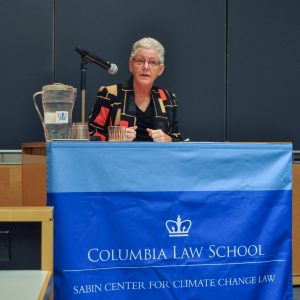Former EPA Administrator Gina McCarthy delivered the third David Sive Memorial Lecture on Environmental Law at Columbia Law School on Thursday, September 28. Sharing her thoughts on “The Present and Future of the EPA,” she sharply critiqued the actions of Scott Pruitt’s EPA as illegal and without scientific basis or direction, while finding hope in the progress spurred by investment, innovation, and democratic participation.
“This is the first administration in history at EPA where the administrator has absolutely no vision moving forward that isn’t about looking in the rearview mirror at the past eight years and rolling back every single thing that happened, without any discriminating analysis about if any of them were any good,” McCarthy said. As of October 2nd, the Sabin Center’s Climate Deregulation Tracker has already identified 77 steps taken by the Trump administration and Congress to scale back or wholly eliminate federal climate mitigation and adaptation measures.
While expressing confidence in the court system to uphold the environmental protections EPA created during her tenure, McCarthy also shared her frustrations that so much progress “feels up for grabs.” Her fears will likely be tested very soon, as the Trump Administration is expected to release its plans to repeal and potentially replace the Clean Power Plan, the Obama Administration’s signature effort to regulate greenhouse gas emissions from existing coal-fired power plants, in advance of an Oct. 7th court deadline.
The anticipated Clean Power Plan repeal-and-replace scheme will, of course, need to pass muster before the courts. Though the DC Circuit agreed to hold the Clean Power Plan litigation in abeyance, the Court also recognized EPA’s “affirmative statutory obligation to regulate greenhouse gases.” Under black letter administrative law, new regulations cannot be “arbitrary, capricious, an abuse of discretion, or otherwise not in accordance with law.” The rescission of rules must meet the same standard.
Additionally, if an agency issues a new policy, it must give “good reasons” for the change. Drawing on Supreme Court precedent, the 9th Circuit explained, “[W]hen a new policy is contradicted by an agency’s previous factual findings, the law does not allow the agency to simply ignore the earlier findings. Instead, the law requires that the agency provide a reasoned explanation for changing course and adopting a position contradicted by its previous findings”(internal citations omitted). In her talk, McCarthy asserted, “I’m ready for a fight. . . Every rule we did in the Obama Administration has a basis in law and science.”
McCarthy also touched on the many “mandatory duties” she had under environmental law and the opportunity for litigation to compel action. A vanguard of cities, states, environmental groups, and democracy-promoting nonprofits have already taken this view to heart, opposing regulatory delays and demanding transparency from the Trump Administration. (Their progress can be tracked in our U.S. Climate Change Litigation Database.) For example, the city of New York and ten states sued the Department of Energy (DOE) after they delayed the effective date for final energy conservation standards for ceiling fans—which make a significant demand on U.S. electricity. Following the litigation, the DOE confirmed in the Federal Register that it would end the delay and the rules would become effective on September 30th, 2017. Similarly, litigation brought by eight states has pushed the Trump Administration to move forward on requirements for states to track greenhouse gas emissions from vehicles on federal highways.
McCarthy also noted that she is heartened by the business innovations she has been seeing come through the door in her new role as an advisor at Pegasus Capital Advisors LP, a private equity firm focused on sustainability. Even while the federal government “is creating chaos and uncertainty” that is “bad for business,” she said, “the private sector is moving forward in the right direction.” She particularly noted transformation in the clean energy and transportation sectors.
Additionally, McCarthy acknowledged the climate leadership of localities and states. She stressed to the audience that little federal progress occurred on climate change prior to the Obama Administration and that creative federal advancement on climate change built off of the “blood and sweat” of efforts from the grassroots, cities, and states. This spirit is alive today as well. Even as President Trump has signaled his intent to withdraw from the Paris Agreement, a coalition of over 2300 leaders of cities, states, businesses, and universities, have pledged that they are “still in.”
Most of all, she urged everyone not to despair or lose hope. (She suggested that no one “pound [their] head against the wall for longer than ten minutes.”) Rather, she encouraged concerned citizens to speak out, submit public comments, and not let the Trump administration silently cut environmental protection by defunding initiatives it could not otherwise find a legal way to eliminate. For example, under Administrator Pruitt, the EPA has been considering cutting its reimbursements to the Department of Justice for its Superfund litigation that compels polluters to pay for clean-up of sites they have contaminated with hazardous waste. Before taking questions from the audience, McCarthy closed with words of wisdom from her father: “The only thing you have to do is fight the good fight.”
The David Sive Memorial Lectures are sponsored by the law firm of Sive Paget & Riesel in honor of their late partner, David Sive, Columbia Law School Class of 1948, who was one of the early pioneers of environmental law.



